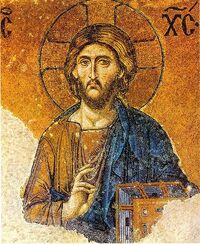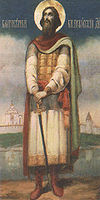(Created page with '<center><div style="color:#FFF; background-color:#333; border: 1px solid #666; padding:5px;">''' Main Portal - Religion Portals - Projects - [[Religion Wiki s...') |
No edit summary |
||
| (12 intermediate revisions by 2 users not shown) | |||
| Line 1: | Line 1: | ||
| + | {{religion browsebar}} |
||
| − | <center><div style="color:#FFF; background-color:#333; border: 1px solid #666; padding:5px;">'''[[Portal | Main Portal]] - [[Religion Portals]] - [[Projects]] - [[Religion Wiki staff]] - [http://religion.6forum.info// WikiForum] - [http://frisoandrozalin.mygb.nl// guestbook] - [[credits|credits ]]'''</div></center> |
||
| − | <div style="color:#FFF; background-color:#333; border: 1px solid #666; padding:5px;"> |
||
| + | ---- |
||
| + | {| width="100%" cellpadding="5" cellspacing="10" style="background:#FF6666; border-style:solid; border-width:1px; border-color:#ff0000;" |
||
| + | | width="55%" valign="top" style="padding: 0; margin:0;" | |
||
| + | <div style="float:right; width:100%;"> |
||
| + | |||
| + | <center>'''<font color=#ffffff><big>T</big>HE <big>E</big>ASTERN <big>C</big>HRISTIANITY <big>P</big>ORTAL'''</font></center> |
||
| + | |||
| + | {{/box-header|<big>Showcased Eastern Christian content</big>|{{FULLPAGENAME}}/Intro|}} |
||
| + | {{{{FULLPAGENAME}}/Intro}} |
||
| + | {{/box-footer|[[Eastern Christianity|'''Learn more about Eastern Christianity...''']]}} |
||
| + | |||
| + | <div style="text-align:center;margin:0.25em 0 0.75em 0">{{purge|'''Show new selections'''}}</div> |
||
| + | </div> |
||
| + | |||
| + | <div style="float:left; width:55%"><!-- This width add to the the margin below to equal 99%--> |
||
| + | |||
| + | {{Random portal component|max=7|header=Selected article|subpage=Selected article|seed=23}} |
||
| + | |||
| + | {{Random portal component|max=3|header=Selected picture|subpage=Selected picture|seed=43}} |
||
| + | |||
| + | {{Random portal component|max=4|header=Did you know...|subpage=DYK|seed=113}} |
||
| + | </div > |
||
| + | |||
| + | <div style="float:right; width:44%;"> <!-- This width add to the the margin below to equal 99%--> |
||
| + | |||
| + | {{Random portal component|max=9|header=Selected biography|subpage=Selected biography|seed=43}} |
||
| + | |||
| + | {{/box-header|Selected holy days|Portal:Eastern Christianity/Anniversaries/{{CURRENTMONTHNAME}}|}} |
||
| + | {{Portal:Eastern Christianity/Anniversaries/{{CURRENTMONTHNAME}}}} |
||
| + | {{/box-footer|}} |
||
| + | |||
| + | {{/box-header|Categories|{{FULLPAGENAME}}/Categories|}} |
||
| + | {{/Categories}} |
||
| + | {{/box-footer|}} |
||
| + | |||
| + | {{/box-header|WikiProjects|{{FULLPAGENAME}}/Projects|}} |
||
| + | {{{{FULLPAGENAME}}/Projects}} |
||
| + | {{/box-footer|}} |
||
| + | </div> |
||
| + | |||
| + | <div style="float:right; width:100%"> |
||
| + | |||
| + | {{/box-header|Related topics|{{FULLPAGENAME}}/Topics|}} |
||
| + | {{{{FULLPAGENAME}}/Topics}} |
||
| + | {{/box-footer|}} |
||
| + | |||
| + | {{/box-header|Things to do|{{FULLPAGENAME}}/Things You Can Do|}} |
||
| + | {{{{FULLPAGENAME}}/Things You Can Do}} |
||
| + | {{/box-footer|}} |
||
| + | |||
| + | |||
| + | </div> |
||
| + | |||
| + | |} |
||
| + | |||
| + | __NOTOC__ __NOEDITSECTION__ |
||
| + | [[Category:Christianity portals|Eastern Christianity]] |
||
| + | [[Category:Eastern Christianity]] |
||
| + | [[Category:Christianity portals|Eastern Christianity]] |
||
| + | [[Category:Eastern Christianity]] |
||
[[category:Portals]] |
[[category:Portals]] |
||
Latest revision as of 00:48, 7 January 2010
Atheism ·
Judaism ·
Bahá'í Faith ·
Sikhism ·
Buddhism ·
Tibetan Buddhism ·
Mahayana Buddhism ·
Theravada Buddhism ·
Catholicism ·
Anglicanism ·
Christianity ·
Eastern Christianity ·
Orthodox Christianity ·
Hinduism ·
Islam ·
Sunni Islam ·
Shia Islam ·
Mormonism ·
Church portals ·
·
Scriptures:
Showcased Eastern Christian content
Eastern Christianity refers collectively to the Christian traditions and churches which developed in the Balkans, Eastern Europe, Asia Minor, the Middle East, Northeastern Africa and southern India over several centuries of religious antiquity. Eastern Christians have a shared tradition, but they became divided (SEE: SCHISM) during the early centuries of Christianity in disputes about christology and fundamental theology. In general terms, one can identify four branches or families of Eastern Christianity, each of which has distinct theology and dogma. They are: the Assyrian Church of the East, the Eastern Orthodox Churches, the Oriental Orthodox Churches, and the Eastern Catholic Churches - the latter being in full communion with the Roman Catholic Church.
All of the Eastern branches, as well as the Western churches, share a common Christian tradition and most of the same Christian Biblical canon. The Eastern branches also share traditional practices in common which are not shared by the Western churches. The Eastern churches' differences from Western Christianity have as much, if not more, to do with culture, language, and politics as theology. The Assyrian Church of the East became estranged from the church of the Roman Empire in the years following the Council of Ephesus (431), Oriental Orthodoxy separated after the Council of Chalcedon (451), and the split between the Roman Catholic Church and the Eastern Orthodox Church is usually dated to 1054. This event is referred to as the Great Schism. Selected article
Aramaic is a group of Semitic languages with a 3,000-year history. It has been the language of administration of empires and the language of divine worship. It is the original language of large sections of the biblical books of Daniel and Ezra, and is the main language of the Talmud. Aramaic was the native language of Jesus (see Aramaic of Jesus). Modern Aramaic is spoken today as a first language by numerous, scattered communities, most significantly by Assyrians, Syriacs, and Chaldeans. The language is considered to be endangered. Christian missionaries brought the language into Persia, India and even China. From the seventh century AD onwards, Aramaic was replaced as the lingua franca of the Middle East by Arabic. However, Aramaic remains a literary and liturgical language among Jews, Mandaeans and some Christians, and is still spoken by small isolated communities throughout its original area of influence. The turbulence of the last two centuries has seen speakers of first-language and literary Aramaic dispersed throughout the world.
Selected pictureConstantinople was the imperial capital of the Roman Empire (330–395) and the Byzantine/Eastern Roman Empire (395–1204 and 1261–1453). Did you know...
Selected biography
Saint Justinian, 482 or 483 CE – 13 or 14 November 565, was the second member of the Justinian Dynasty (after his uncle, Justin I) and Eastern Roman Emperor from 527 until his death. He is considered a saint amongst Eastern Orthodox Christians, and is also commemorated by the Lutheran Church. One of the most important figures of Late Antiquity, Justinian's rule constitutes a distinct epoch in the history of the Byzantine Empire. The impact of his administration extended far beyond the boundaries of his time and empire. Justinian's reign is marked by the ambitious but ultimately failed renovatio imperii, or "restoration of the empire". This ambition was expressed in the partial recovery of the territories of the Western Roman Empire, including the city of Rome itself. A still more resonant aspect of his legacy was the uniform rewriting of Roman law, the Corpus Juris Civilis, which is still the basis of civil law in many modern states. His reign also marked a blossoming of Byzantine culture, and his building program yielded such masterpieces as the church of Hagia Sophia, which was to be the center of Eastern Orthodox Christianity for many centuries. A devastating outbreak of bubonic plague in the early 540s marked the end of an age of splendor. The empire entered a period of territorial decline not to be reversed until the ninth century.
Selected holy daysTemplate:Portal:Eastern Christianity/Anniversaries/April CategoriesWikiProjects
Related topicsHistory: Byzantine Empire - Crusades - Ecumenical council - Christianization of Bulgaria - Christianization of Kievan Rus' By region: Asian - Copts - Eastern Orthodox - Georgian - Ukrainian Traditions: Assyrian Church of the East - Eastern Orthodox Church - Eastern Catholic Churches - Oriental Orthodoxy Liturgy and Worship: Sign of the cross - Divine Liturgy - Iconography - Asceticism - Omophorion Theology: Hesychasm - Icon- Apophaticism - Filioque clause- Miaphysitism - Monophysitism- Nestorianism - Theosis Things to do
Please help us do all of this and more at our projects:
|





